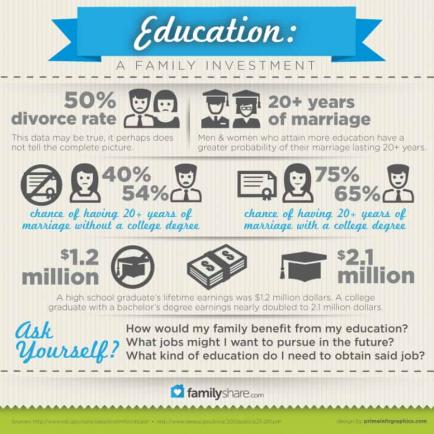
You know those statistics you hear, about the divorce rate being about 50 percent? Although this data may be true, it does not tell the complete picture. There are actions we can take to make our individual likelihood of divorce much lower.
According to the National Survey of Family Growth, men and women who attain more education have a greater probability of their marriage lasting 20 years or longer. Among women who have less than a high school diploma, only 40 percent of marriages last 20 years or longer. Among women with at least a bachelor's degree, however, 78 percent of marriages last 20 years or longer. The pattern is similar for men.
Why does education play a role in divorce rates?
Parents who attain more education are more likely to stay together and for a longer period of time. Added education means an increased and more stable income. If couples are willing to invest in an education now, they may find more stability and happiness within the relationship in years to come. Education is a family investment because it keeps families together.
It is no secret that low-income families face a host of challenges. By looking for ways to increase your education you can increase the stability of your family. What if you already have a job? Increasing your education can increase your job security. Attaining more education may offer additional job opportunities and secure the position you have. What if you have kids at home? There are a number of avenues that someone can take to get an education while facing immense challenges. Most universities offer a variety of online courses. Some educational institutions may be almost entirely online. This allows students to pursue education more freely from home and at varied time schedules.
According to the US Census Bureau, the average earnings for a full-time employee with a high school diploma over a lifetime total $1.2 million. By obtaining a bachelor's degree the average lifetime earnings nearly double, to $2.1 million.
One of the biggest challenges that families will face is whether to pursue education. Some families will rationalize that education isn't necessary and that it doesn't pay off. Have the foresight to see the bigger picture. Jobs aren't stable, people get sick, family members pass away, and economies shift. Sacrificing anything to obtain an education is a family investment. Your family will be able to endure greater pressures because your job is stable and your skills are flexible.

